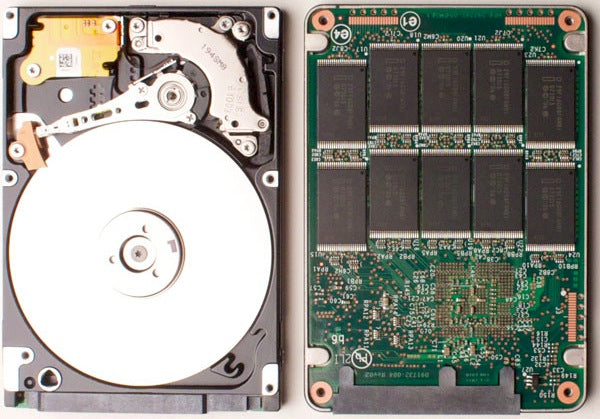Hello everyone,
Welcome to the third Econext Informatique blog . In our previous blog , we explained why the amount of Random Access Memory (RAM) is not so important for your computer compared to other specifications that are essential.
Most computers sold at the big box have specs that are attractive for sale , but unbalanced that aren't viable in the long run. Thus, you are satisfied during the 30 days following the purchase and suddenly, over time, your computer gets old .
The internal components of the computers sold in these stores are not made to last, only to sell, a product that sounds appealing to the average non-computer user.
The third subject brought will be about the SSD Disk. It is a disk or a hard disk. A chip or is it moving in there ? We tell you about it!
First a hard drive, you know what it is , no.. This invention was a request from the US Army to IBM for a project in .... 1956.
The appearance of the first hard disk was in 1957 officially and here it is , here it is. 
As you can see , there are DISCS. These discs are HARD. hence the name Hard Disk . Doesn't get more original than that . It was initially a series of 50 24-inch discs that all spun together at a speed of 1200 rpm. All this to hold 5 MB of data, which is around 10 Word documents these days . And this, for the modest sum of 50,000 U S $ .
Over the years, the magics of the hard disk have become known and almost everyone , still alive today, has experienced the use of hard disks. Some will have known hard drives in its infancy and others will have known today's hard drives with 10000x larger storage capacities for 10000x less space than their ancestor, the ''IBM 305 RAMAC ''.
However, the appearance of a new genius jeopardizes the existence of this more than 60-year-old technology. The famous solid state drive or solid state drive.
The real name is Solid State Drive. In this ''disc '', there is nothing that spins and, sorry to tell you , but there is no disc ... It's an electronic memory that has no moving parts, needs very little electricity, and requires very little effort from your computer to operate, unlike its predecessor .
But.. What 's the advantage that there are no moving parts inside? In fact, the hard disk rotates between 5400 and 15000 revolutions per minute depending on its quality and function. As it spins, a read head acts as a seeker head to find your data which is hidden somewhere on the surface of these discs inside the hard drive. Of course, the speed at which the head will find the information you ask for will be faster if your hard disk is spinning faster , but there will always be a delay between your request and the opening. Whether it 's an image, a video or even a Word document , the head is constantly doing a search job to find the documents hidden in the dark corners of your hard disk, the bigger the document, the longer it will take to his head to read everything you ask him, naturally. And be careful, if you drop your computer or move it suddenly while it's running, your homing head may hit the disk a little too hard and damage it.
In the case of the SSD, we forget that... No homing, no revolutions per minute. It's electronic access to information , instantly or at least 4-10x faster than your hard drive.
No moving part aging, no misreading , head getting tired, no creepy noise like your computer's cover is going to get swallowed up by what's inside. Nothing, not a sound, not a movement, but an almost instantaneous speed .
That said, why don't all computers come with SSDs?
Because it is an innovative and trendy technology and who says t trend says t expensive and that the manufacturers prefer to put a slow and known part (Hard disk) with an astronomical capacity rather than a fast piece with little capacity. SSDs are famous for offering speed , but little storage space. The majority of SSDs have 240 GB or 480 GB of space. For the same price, you can have a standard hard disk of more than 2TB (2000 GB).
Manufacturers know again that you don't necessarily know SSDs , but you know that 1000gb is about 4x more than 240gb . It 's strictly marketing . They know that many of you will think that a computer with a 1TB (1000gb) hard drive is much better than a 240gb SSD and that it will make you feel like you are getting more for your money and yet it is false and even the reverse.
A 1000 GB hard drive can hold up to 130,000 photos . Who really needs this? At the speed that a hard drive goes it will probably take you 15 years to go through all those 130,000 photos one by one.
On our side , our computers all come with SSDs without exception. It is an advantage to have an SSD despite its lower capacity compared to a standard Hard Disk .
So be careful, rather than buying space, buy a nice speed for the space you need. It's a question of logic. 
Here is a pictorial comparison: If you cook a lot and have 2 children, you will buy a nice house with 3, maximum 4 bedrooms and an efficient and functional kitchen (SSD). You won't choose the house with 7 bedrooms and a badly configured kitchen (HDD). It's the same principle for hard drives . The only thing they have to offer is space that you don't need, go for efficiency instead !
Think about it!

